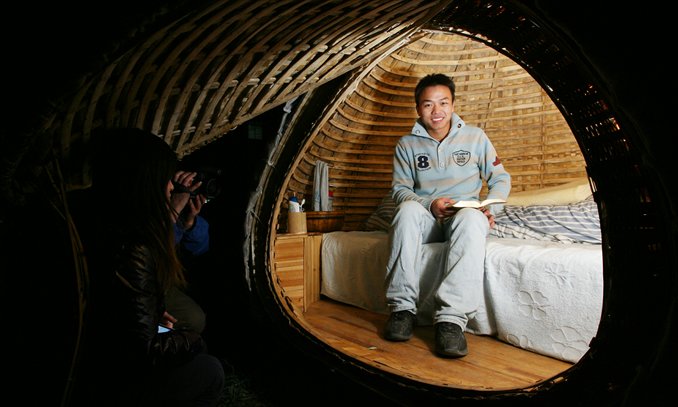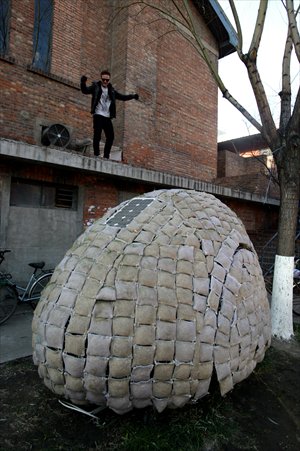Profile: ‘Egg-house’ resident finds his new home outside Beijing


After years of living in humbler dwellings, Dai Haifei, 27, finally owns his own house, joining tens of millions of Chinese who are paying off mortgages. But Dai is not your average new homeowner. Back in 2010, he drew headlines nationwide for living in an egg-shaped house of his own design, a move which many took to be a silent protest against skyrocketing housing prices, but Dai says that's all nonsense.
For many, Dai's ovular abode, and its relative the "capsule apartment," represented the struggle that the average person on the lower strata of society must face, and the memory that his famed homestead has imprinted on millions of Chinese has long outlived the two months he actually lived there.
He lived in this little egg-home from October to December of 2010, choosing to leave it when it became too cold in winter.
People have reacted in different ways to Dai's story. Many assumed he was too poor to rent a proper room, or that he was carrying out a silent protest against the government's housing policies. Others also wondered whether the whole thing was a publicity stunt for Dai, an architect, and the company he worked for.
"I had no intention of making it a political thing … I majored in architecture, I had time, and I just wanted to play," he said. But people hear only what they want to, and for those who wished for something to lower real estate prices, Dai was seen as fighting for the masses.
A architecture graduate from Hunan Province, he says that working in his field, and nothing more, inspired him to build his egg-home.
Building his own 'egg'
In 2010, Beijing-based Standard Architecture, where Dai worked at the time, unveiled a concept architecture project in an exhibition in Shenzhen, Guangdong Province. The idea was to make it as if eggs had been laid in cities, with a number of egg-shaped, movable houses scattering the landscape.
According to the concept, the owner, most likely a migrant worker, could live in the egg and run a business out of it by day, like a diner or a KTV parlor.
Dai decided to take this conceptual design and make it a reality, at a cost of about 20,000 yuan ($3,218). Dai borrowed the money he needed and began constructing the shelter in July 2010 using iron wire, bamboo, sandbags and plexiglas.
Two months later, his house was completed. He decided to transport it from Shenzhen to Beijing so that he could live in it and save money on rent. Dai found a truck that would be moving a yacht to the capital, and it had some extra space to stow his "egg." When he first told movers that the egg was his house, no one believed him, so he took to telling people it was a space capsule.
Once he settled in Beijing, he began tending to the grass that was growing on the egg's sandbag exterior, an element of the original Standard Architecture concept that would prevent local authorities from deeming the "city eggs" eyesores.
City management did pay him a visit during the two months he stayed in the egg, but surprisingly all they wanted was proof from his company that the egg was for research, not for official accommodation.
Finding Christ
Dai first came to Beijing in 2009, the year before he graduated from a college in Hunan, and worked as an intern. After an illness sent him back to his hometown, he reevaluated many of his previously unquestioned beliefs. After he recovered and came back to Beijing, he was changed forever.
Dai had grown up believing that hard work is the key to success. "Control everything in your world, and be your own God," Dai often told himself.
"Later I realized that a person's abilities are limited, and there are some things which you cannot control. I began to reflect on myself, and saw my weaknesses. I was not invincible as I once thought, and I need to be humble and obedient," he said.
He began to go to church, just to hear the music, which moved him.
Dai's original dream was to study urban planning, but he abandoned the idea when he chose his major. "Working in architecture is more practical. Who can offer you a chance to plan cities?" he reasoned.
In the church, Dai met a woman named Huang Di, whom he married in May 2012.
For Huang, the egg-home is just a product. "It shows the designer's optimism toward life. It's more about innovation and romance, not sadness," she said.
Signing on the dotted line
It was not until Dai and Huang were faced with having no shelter, when their landlord broke their lease agreement, that they decided to buy a house. Before this, they never thought of owning their own home, seeing it as too expensive, especially in Beijing where homes generally go for 3 million to 5 million yuan.
After learning that houses in Yanjiao district in Hebei Province, at least a 30-minute bus ride from Beijing's CBD, were going for about 8,000 yuan a square meter, the couple decided to make their move.
After a down payment of 300,000 yuan, the couple got a 30-year mortgage of 4,000 yuan a month. Their new home is being built at the moment, and they will get the key in September.
Their son was born on February 15. They named their new child Dai Tata. The first "ta" means God, and the second means human being, as written in Chinese characters. "We hope our son will be a priest, one who can lead others and be blessed by God," Dai said.
Since his first move to Beijing in 2009, Dai has moved six times, including to the current house where he lives with his family. Each move has taken him farther and farther from the center of the city.
Currently, they live outside the North Sixth Ring Road, where they pay 2,800 yuan a month for rent. Dai plans to ask his firm for a raise in light of his new mortgage payments.
Dai says he still has one dream in mind: to build his own house. "I have a countryside hukou, which means I can build on my land," said Dai. This dream is remote, and today he looks forward to his house in Beijing. After it is completed, he will decorate it as his own home, the one he has always longed for.
Global Times - Southern People Weekly